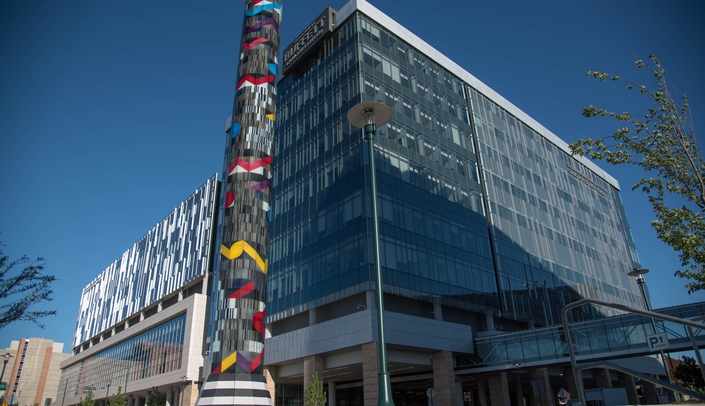A few new changes to the NE-INBRE program noted below will enhance specific areas, strengthen collaborations and ensure the continuation of the program, said Paul Sorgen, Ph.D., director.
These areas of expansion and improvement are a result of careful consideration and discussion as to how to best utilize the resources provided by the National Institutes of Health, National Institute of General Medical Science.
These adjustments also help ensure the three pillars of the program:
- To help establish a culture of research at undergraduate campuses throughout Nebraska;
- To build a pipeline for potential graduate students; and
- To enhance the research capacity on the research campuses.
"The following changes will better serve the network and facilitate putting forth the strongest grant application next year," Dr. Sorgen said.
Introducing
A new scientific theme
A clear scientific strength in Nebraska is cancer biology. In light of the opening of the Fred & Pamela Buffet Cancer Center cancer biology is being introduced as an area of focus.
The introduction of this new scientific theme will position the NE-INBRE program to better collaborate with researchers in the Buffett Cancer Center, a National Cancer Institute designated cancer center at UNMC.
Kate Hyde, Ph.D., an assistant professor in the department of biochemistry and molecular biology at UNMC, will be the theme director. Along with Becky Deegan, Ph.D., an associate professor in the department of biochemistry and molecular biology at UNMC, Dr. Hyde will form a grant-writing program to benefit the NE-INBRE faculty.
The other two existing scientific themes include:
- Cell signaling, under the direction of Becky Deegan, Ph.D., an associate professor in the department of biochemistry and molecular biology at UNMC;
- Infectious diseases, under the direction of Charles Woods, Ph.D., the Lewis Lehr/3M University Professor and director of the Nebraska Center for Virology at the University of Nebraska-Lincoln
A new core facility
For more than 16 years, core facilities at the three research institutions in the INBRE program have played an integral role in enhancing the research capacity of all of the participating institutions.
To strengthen that role even further, a new core facility is being brought on board, while another is being retired.
The Advanced Microscopy Core at UNMC will replace the Structural Biology Core and be merged with the Integrated Biomedical Imaging Core at Creighton University.
This will strengthen the microscopy core at Creighton, reflect a stronger working relationship with a COBRE funded core, as well as show a collaborative effort between research institutes, said Paul Sorgen, Ph.D., director of the INBRE program.
However, Dr. Sorgen said, the change will not affect the DRPP program.
"There are several faculty who still use the Structural Biology Core as part of their research and we will continue to support them," he said.
